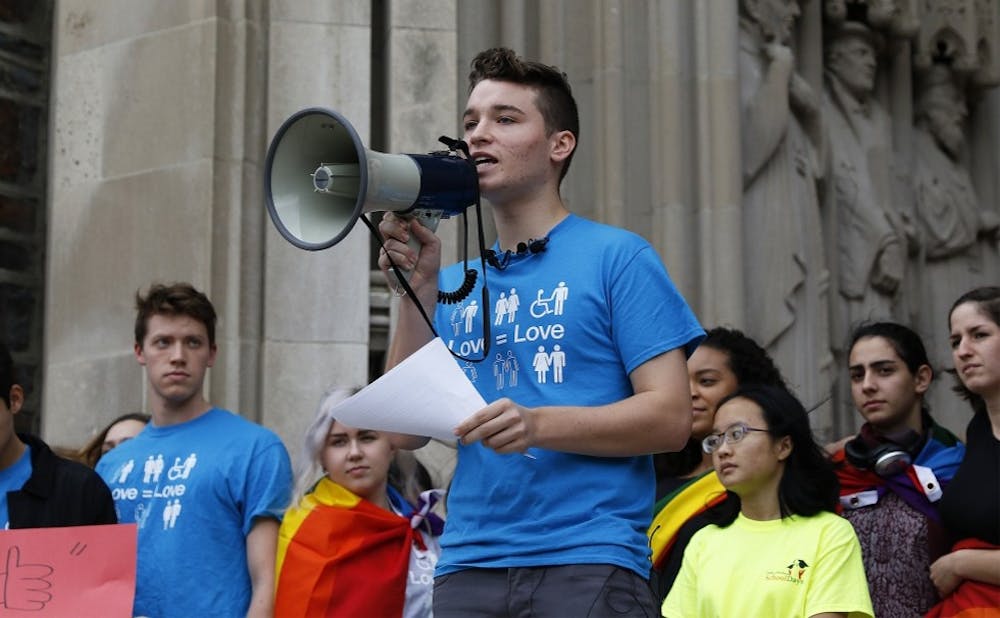When sophomore Jack Donahue took a leave of absence to seek treatment for depression and anxiety in October, he did not anticipate the difficulty he would face returning to Duke.
But Donahue claims his appeal to be readmitted for Spring 2017 semester was denied in November because of the Office of Student Returns’ medical leave of absence policy, which states that the "expected leave time is two full terms." Donahue is now petitioning the University to reconsider, describing the policy as "prejudicial, against the Americans with Disabilities Act and cruel." The petition, created Friday night, currently has more than 1,200 signatures.
In November 2015, Donahue was the target of a death threat when a homophobic slur was written on the first-floor corridor of East Residence Hall. He wrote in the petition that the threat contributed to his mental health issues. However, he noted that now he wants to return because he is "ready and [has] been cleared to return by all of my health professionals."
“I discussed my sincere and ardent desire to only be on leave for Fall 2016 before I even signed,” wrote Donahue in an email to The Chronicle. “I was first requested to submit an additional recommendation and then was told I wasn’t up for consideration for a Spring 2017 return after my trip to Durham.”
Donahue admitted in the petition that he violated Duke’s MLOA policy on campus visitation—which says you cannot be on campus during the leave of absence—when he returned to Central Campus for his birthday weekend in November to see his friends. During this incident, he requested to be EMS-ed from Central Campus after consuming several alcoholic drinks he believes interacted adversely with his new medication. Donahue claimed that the Office of Student Returns is using this incident to reject his application to return a semester early.
On its website, the Office of Student Returns says that students are supposed to remain on leave for two semesters to ensure adequate treatment of health issues.
"Students placed on a medical leave of absence are expected to remain on leave for two semesters beyond the semester in which the leave was granted," the OSR website reads. "This ensures that there is adequate time for transition, diagnosis, treatment, and stabilization so that the student can return to Duke from a position of strength and without additional (undesired) interruptions in their degree pursuit."
In October 2015, Duke updated the leave policy to explicitly state that medical leaves can be longer or shorter than two semesters, whereas in the past the policy stated that they were required to be at least two semesters. OSR's policy on requesting an early return from MLOA is that "an early request will be given a full review," according to its website.
But Donahue alleges that the administration has refused to answer his questions, that his petition was denied without explanation and that communications with him since have been "poor and infrequent."
“I do not believe that this violation justifies my being barred from school for an entire semester,” wrote Donahue in his petition. “The Office of Student Returns seeks to take this accidental and minor infraction and force me to unnecessarily stay at home for another seven months with little to no resources.”
Michael Schoenfeld, vice president for public affairs and government relations, declined to comment on Donahue's case, citing privacy concerns. The Family Educational Rights and Privacy Act does not allow universities to disclose certain private information without written consent.
“The University respects the privacy rights of all students and cannot comment on any individual’s academic or medical situation,” he wrote.
Donahue wrote that he thinks that Duke’s policy violates the Americans with Disabilities Act, arguing that there have been students on MLOA for physical illnesses who have been allowed to return after one semester.
"This policy explicitly discriminates against the mentally ill, as a student who left with a physical ailment and wanted to return a semester later with doctor’s approval would never face this treatment," he wrote in his petition.
Arlie Petters, dean of academic affairs and associate vice provost for undergraduate education, could not be reached in time for comment.
Many Duke students have rallied behind Donahue.
“I don't understand why Duke University, which has an internationally renowned hospital and medical school, isn't listening to the recommendations of trained health professionals in Jack's case,” wrote sophomore Solomon Yirga, one of Donahue's friends. “At this point, Jack is prepared to return and use local mental health resources while also having the social support of his friends.”
Senior Pooja Mehta, who has dealt with mental illness herself, criticized the MLOA policy as "too broad to be truly effective." She said that only the opinions of the student’s medical professionals and medical professionals at Counseling and Psychological Services should determine whether a student is capable of returning.
“The administration does not have the expertise and information to truly determine if a student is able to return to Duke,” Mehta wrote. “And it is truly upsetting that administrators everywhere choose to stand by flawed policies rather than make accommodations to do what is best for the student.”
Larry Moneta, vice president for student affairs, also said that the administration had no comment on the matter.
Get The Chronicle straight to your inbox
Signup for our weekly newsletter. Cancel at any time.

